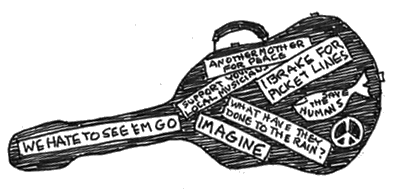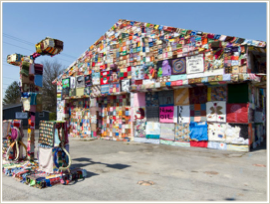


If
Malvina were living in these times, she would be blogging. From 1976
until she died in 1978, Malvina put out an occasional newsletter called
Sporadic Times. This meant typing on a typewriter, going to the copy
shop, addressing the copies, and mailing them by snailmail. If she’d had
the internet, I’m guessing Sporadic would have been less sporadic.
Here’s the first item from the third issue, June, 1976.
It’s a bit early for my epitaph, but I’ve made a resolution to get things done on time and not wait till the last minute.
Wake For a Singer
Celebrate my death for the good times I’ve had,
For the work that I’ve done and the friends that I’ve made,
Celebrate my death, of whom it could be said,
“She was a workingclass woman, and a red.”
My man was the best, a comrade and a friend,
Fighting on the good side to the very end,
My child was a darling, merry, strong and fine,
And all the world’s children were mine.
Here’s the second item:
I’ve
been on the side of women’s liberation ever since I can remember, and
my mother was, too. I have supported the fight for equality no matter
what the size shape color age or sex, religion, nationality or race.
But
I have always been uneasy about being identified as a Feminist, not
quite knowing what the word meant, or that anyone quite knew, but
feeling that there was war between the sexes implicit.

Twice I’ve turned down invitations to take part in the National Women’s Music Festival
in Champaign, Ill. but this, the third year, I did go. The festival was
held on the U. of Illinois campus and, largely the work of a small
committee, was excellently organized, with a wealth of talent that was
breathtaking. I led two workshops, one in Songwriter Survival, one The
Song and the Message, and appeared in concert. I had to leave early
because I had other commitments.
On
Thursday, the day before I left, it looked as though the evening’s
concert and subsequent ones would never happen. Some individual women,
extremist Separatists (my first contact with this movement), had
threatened to disrupt the concert unless all men were ordered from the
hall. A leaflet signed by a number of the performers and functionaries
had been distributed, but the extremist threat was verbal. The leaflet
said, in part, “Because of past experience in a sexist society, men,
(regardless of their politics, consciousness, and good intentions)
negatively alter the dynamic of a woman-space because they represent our
oppression. Recognizing the crucial importance of that woman-space,
free of real and/or symbolic oppression, has made many performers choose
to work with all women. It has encouraged many women producers to work
with all women. But so often, the audience is being denied the pleasure
of that valuable all-women experience...We are sorry that the decision
was made for the festival to be open to men.”
If
men were barred from the auditorium, the Festival would have come to an
end, because discriminating in a public place is against the law.
There
was a quick meeting by the committee and some performers, and they
issued this statement. “As performers we demand the right to perform our
music and present our views. We also represent the right of our
audience to hear us.
“All performers knew that the concerts would be open to women and men.
“The
reality is that refusal to comply with Title IX, which guarantees the
right of men to enter the concerts, will terminate the festival
immediately.”
I,
too, distributed a letter. The young women in the Festival office
scrambled, in spite of the lateness of the day and closed facilities, to
get it run off for me. I do not know what their own position on the
matter was, but they could not have been more helpful.
“The
Physical exclusion of men from a Women’s music Festival is a
mechanical, sterile and unpolitical way of dealing with the matter of
our liberation.
“A
Man who comes to our concert is already half a convert and worth
educating. If he is basically an oppressor, he will find that he is in
the wrong place. The likelihood of his coming to the concert is small,
and he would be immediately and easily psychologically overpowered.
“To
class all men together is a stereotyping, false and unproductive. I
have worked with men, including my husband of forty years, in
organizations of struggle for freedom, for a decent world for all
creatures.
“Victor Jara was a man; there are men being tortured in the prisons of Chile, my comrades and brothers in struggle.
“The time is short. We need to be together with all possible allies.
“We
talk of woman space. But unless we find ways of reconciling so that we
can united confront the common enemy, there will soon be no space for
anyone.
“Your loving sister,
Malvina”
The
letters were distributed at the door of the auditorium. I was heartened
by the many young women who came up to me and thanked me for voicing
this position, for the extremists were well organized and emphatic, and
the others had felt overwhelmed.
Through
the action of the committee and their supporters, who made their
presence quietly felt, and through the letters, the extremists were put
on the defensive. Some of them assured us that there would be no
demonstration, a compromise M.C. was agreed on, Holly Near made a short statement of reconciliation before her performance, and the concert went ahead without a hitch and in fine spirit.
The anger of the Feminist women is understandable.
The
system of capitalism, by means of its accumulations of money and power
has been able to maintain itself into a period when it is a total
anachronism, so that everything it touches is poisoned. There is no
longer any productive, creative place in society for these young women,
nor for the young men, either, who are their contemporaries. They are
all rejected and bitter and they take it out on the nearest and most
obvious--each other.
We
have to get smart. The beginning of wisdom is to know our enemy, and
unite our talents, our strength, our courage, to put it out of business
and make way for the new time.
© 2008 by Nancy Schimmel


Monday, May 5, 2008


MALVINA AT THE NATIONAL WOMEN’S MUSIC FESTIVAL






